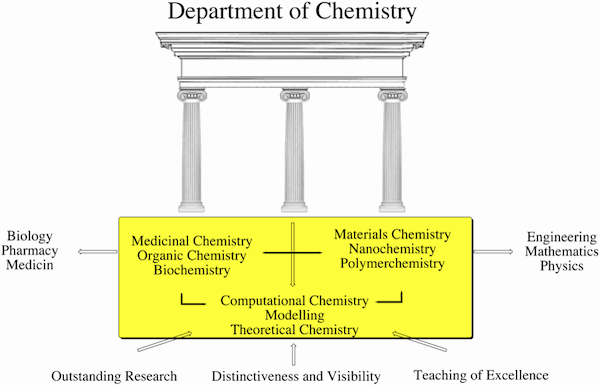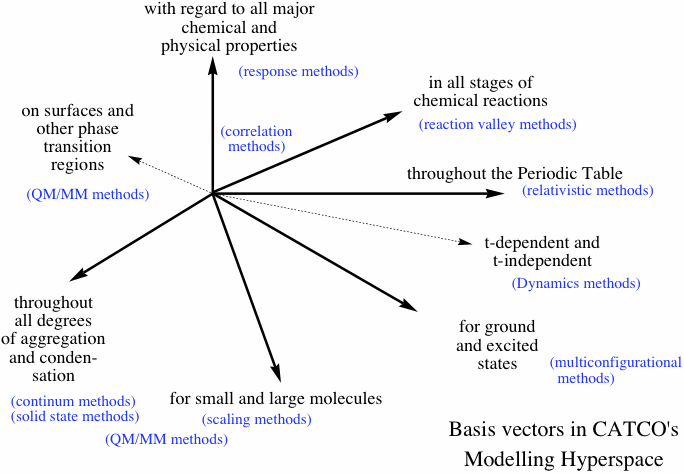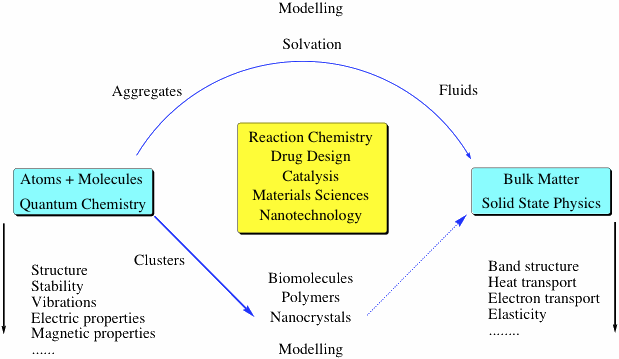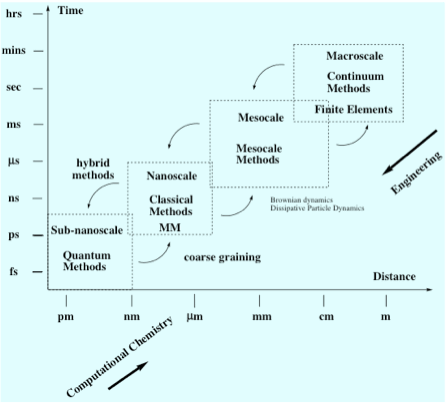
Chemistry plays a central, if not to say leading, role in initiating, carrying out, and supporting developments that help guarantee the sustainability of our world. This can be clearly seen in the health (development of new drugs to fight cancer, Alzheimer, Parkinson, Malaria, etc.), energy (design of new catalysts, solar energy collector materials, hydrogen generation, biofuel), water (materials and processes for filtering and cleaning), and materials (design of materials for new technologies) sectors. For the purpose of full-filling its role and meeting the requirements of our time, Chemistry has changed from a traditionally organized discipline with four or five sub-disciplines to a new research model with many interdisciplinary and multidisciplinary research topics that reach beyond the borders of traditional Chemistry and make chemists the ideal partners for researchers in medicine, biology, engineering, and environmental sciences.
A discipline of chemistry that can substantially contribute to all these fields as well as the metamorphosis of traditional to modern Chemistry is Computational Chemistry. Computational chemistry with quantum chemistry, molecular modeling, and molecular dynamics as its major tools has matured and become an important partner of experimental chemistry in the last decades. These tools are used to shorten and facilitate chemical discovery processes, avoid costly and/or dangerous experiments, and obtain information not amenable to experiment. Accordingly, the mission and vision of CATCO are formulated.
The mission of the CATCO group is:
To install and carry out Computational Chemistry at the Department of Chemistry of SMU with regard to all facets of teaching and research.
CATCO's mission can be further specified as follows:
- Carrying out research in computational and theoretical chemistry at an internationally high standard leading to successful grant applications;
- Developing new methods in quantum chemistry that document the independence of CATCO from commercial software;
- Initiating and supporting interdisciplinary research projects in drug design, materials science, nano-chemistry, reaction chemistry and catalysis together with experimental research groups within and outside the Department of Chemistry;
- Offering undergraduate courses in chemistry at a level of excellence that attracts students to SMU from the Dallas-Forth Worth Metroplex and beyond;
- Supervising, training, and educating graduate and postdoctoral students in a way that they become competent, knowledgeable, and versatile scientists who are able full-fill future leading roles in our society;
- Attracting colleagues, graduate and postdoctoral students to CATCO and SMU for shorter and longer stays in order to foster a vivid and productive research atmosphere within the CATCO group and the Department of Chemistry;
- Presenting CATCO's research accomplishments at national and international conferences;
- Presenting CATCO's research accomplishments to students, colleagues, friends, and alumni of SMU and to the Dallas community.
CATCO's vision is:
The development and application of methods and computer programs in Computational Chemistry for the purpose of initiating, carrying out, and fostering interdisciplinary research and teaching in all areas of chemistry, materials sciences, and nanotechnology at a high level of excellence.
Special objectives that will be fulfilled within the next 3-5 years are:
- Developing and improving quantum chemical methods to facilitate the reliable prediction of molecular properties for a broad spectrum of different chemical and physical situations and the modeling of all states of matter.

- Merging methods from molecular quantum chemistry and solid state physics to model matter at all degrees of condensation, facilitating computational research with regard to materials science and nanotechnology problems.

- Extending and improving the Cal-X methods (developed by CATCO members) that combine calculated and experimental information to gain a new level of insight into the properties of chemical compounds and their chemical reactions.
- Supporting the research of members of the Department of Chemistry by utilizing computational methods and programs developed, maintained, and applied by CATCO members; initiating and supporting in this way intra-departmental interdisciplinary research with the objective of strengthening research at SMU.
- Offering materials science, nanotechnology, surface chemistry, and catalysis courses at the graduate or undergraduate level.
- Providing a special training in form of workshops, intensive weekend and summer sessions to the graduate students of the CATCO group beyond the normal education that will enable them to compete with the best students on a nationwide and international basis.
- Reaching out beyond the borders of the Department of Chemistry, Dedman College, or even SMU to initiate and /or participate in interdisciplinary and multidisciplinary research programs in drug design, reaction mechanism, development of quantum chemical methods, materials science, nanotechnology, catalysis, and other topics.
CATCO's vision for the next 10 years comprises the following goals:
- Modeling materials through all length scales and time scales. CATCO will make the necessary steps to fulfill this goal within the next 10 years.

- Reliably predicting the properties of smart materials in connection with molecular transistors, molecular switches, molecular motors to give chemists and engineers information about the best way of making nano-devices.
- Developing principles, rules, tools, and strategies for computer-assisted materials design (CAMaD) and computer-assisted catalyst design (CACaD) starting from knowledge in Computer-assisted Drug Design (CADD) so that CAMaD and CACaD research can be carried out on a regular basis with reliable predictions within a foreseeable timeframe.
- Supporting and sustaining Materials Science and Medicinal Chemistry groups at the Department of Chemistry, SMU, by interdisciplinary collaborations involving all faculty members with the objective of creating attractive, externally funded, and visible research projects.
- Supporting and being an important part of a Computational Sciences Center at SMU that offers to science and engineering students both at the graduate and undergraduate level educational, training and research possibilities of excellence.
- Offering on a regular basis workshops and summer schools in Computational Chemistry, Materials Sciences, Drug Design, Surface Chemistry, Catalysis, or Nanotechnology for high school students and/or high school teachers as well as interested students and colleagues from other departments and schoo
- Fostering active partnerships with other computational chemistry groups from the Dallas-Fort Worth area to make them visible nationwide and beyond.
CATCO's members are convinced by these objectives and goals because both SMU and its leadership provide:
- An administration that is well aware of the needs of science;
- A superb infrastructure for performing research and teaching of excellence;
- Financial support for research and teaching even at a time when other universities throughout the US reduce significantly financial support in these areas.
